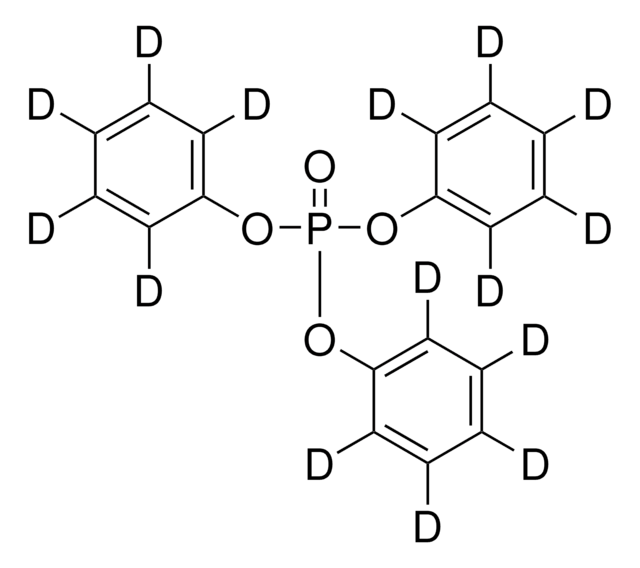338761
Triphenylphosphine-d15
≥98 atom % D, 99% (CP)
Synonym(s):
Tris(pentadeuterophenyl)phosphine, Tri(phenyl-d5)phosphine
About This Item
Recommended Products
isotopic purity
≥98 atom % D
Quality Level
Assay
99% (CP)
form
powder
bp
377 °C
mp
79-81 °C (lit.)
mass shift
M+15
SMILES string
[2H]c1c([2H])c([2H])c(c([2H])c1[2H])P(c2c([2H])c([2H])c([2H])c([2H])c2[2H])c3c([2H])c([2H])c([2H])c([2H])c3[2H]
InChI
1S/C18H15P/c1-4-10-16(11-5-1)19(17-12-6-2-7-13-17)18-14-8-3-9-15-18/h1-15H/i1D,2D,3D,4D,5D,6D,7D,8D,9D,10D,11D,12D,13D,14D,15D
InChI key
RIOQSEWOXXDEQQ-KLHTYYPYSA-N
Looking for similar products? Visit Product Comparison Guide
Related Categories
Application
Packaging
Signal Word
Danger
Hazard Statements
Precautionary Statements
Hazard Classifications
Acute Tox. 4 Oral - Eye Dam. 1 - Skin Sens. 1B - STOT RE 1 Inhalation
Target Organs
Central nervous system,Peripheral nervous system
Storage Class Code
6.1C - Combustible acute toxic Cat.3 / toxic compounds or compounds which causing chronic effects
WGK
WGK 2
Flash Point(F)
428.0 °F - closed cup
Flash Point(C)
220.00 °C - closed cup
Choose from one of the most recent versions:
Already Own This Product?
Find documentation for the products that you have recently purchased in the Document Library.
Our team of scientists has experience in all areas of research including Life Science, Material Science, Chemical Synthesis, Chromatography, Analytical and many others.
Contact Technical Service









